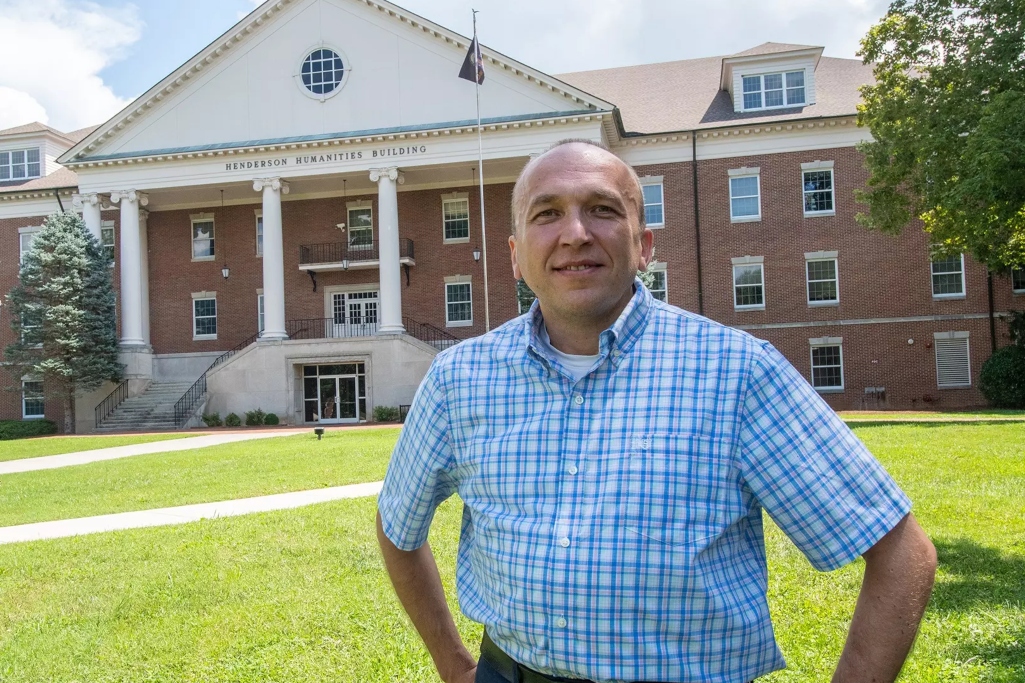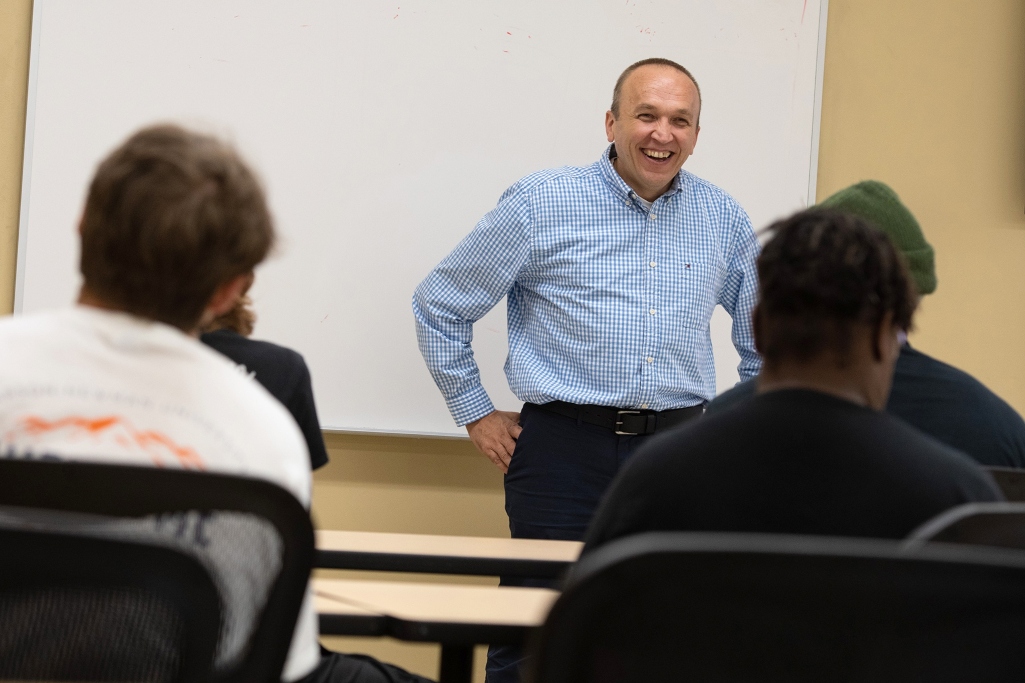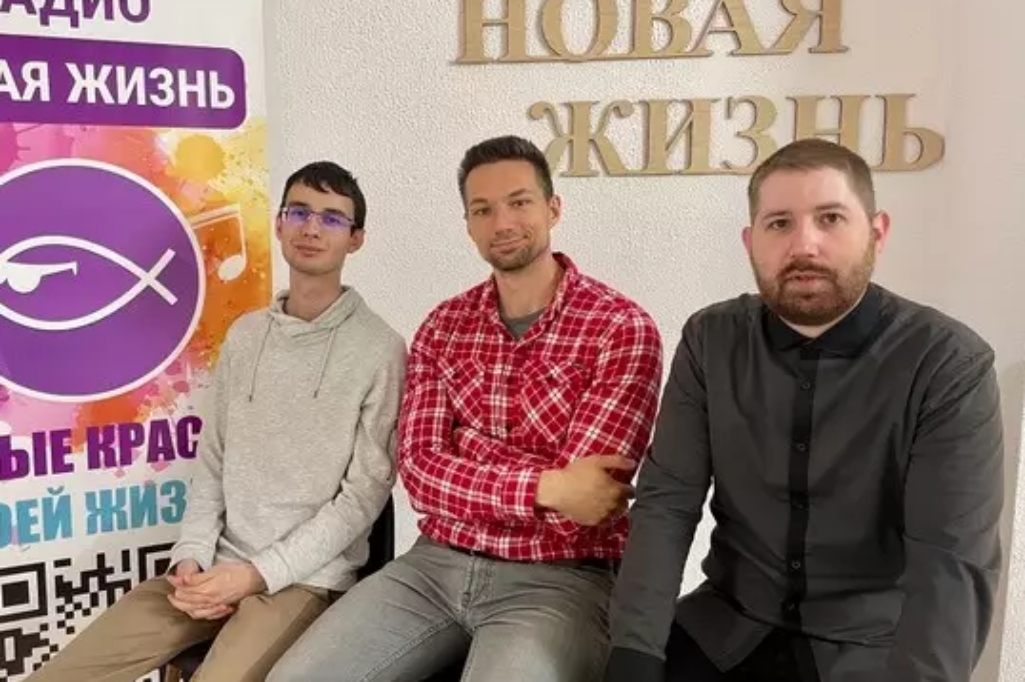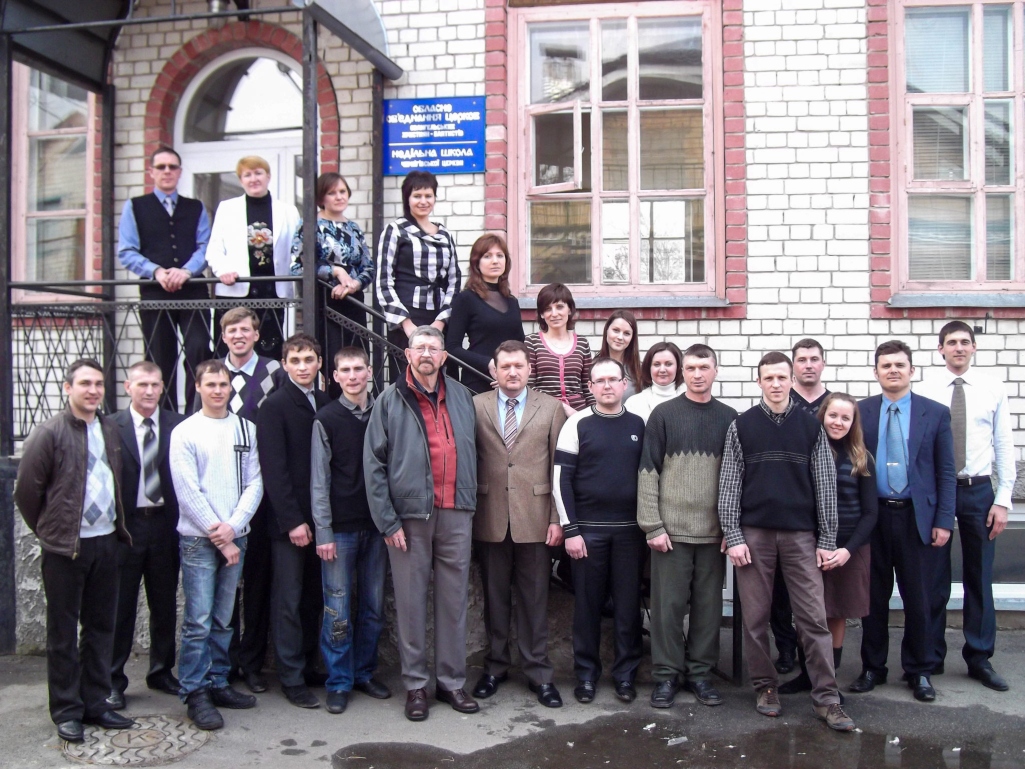
Vova Gorbenko, seen here in front of the Henderson Humanities Building on Carson-Newman’s University’s campus, will be a guest professor this fall as well as assistant director of C-N’s Campus Ministries.
Points along new Carson-Newman University professor Vova Gorbenko’s journey from Ukraine to Tennessee are marked with air raid sirens, explosions, bitter temperatures and a 20-hour drive under the cover of night. The details sound much like they were ripped from a movie plot. But for Vova and his family, every turn, every mile and every step of their story has been real. Very real.
Vova, his wife Marina, their 17-year-old son Andrei and 15-year-old daughter Katya, call Zaporizhzhya, Ukraine, home. One of the country’s largest cities with a population of more than 700,000, Zaporizhzhya is located in the southeastern part of the country – a few hours from Donetsk, and about six hours south of the country’s capital of Kiev. It is where Vova worked as an academic dean at the local seminary and a minister at his church. It was where Marina served as a public school teacher and where Andrei and Katya grew up with friends and went to school. It was home.
But on Feb. 24, life at home was turned upside down. After many weeks of speculation, Russia finally invaded Ukraine. It is Vova’s smile, calm tone and humble spirit that can easily hide the tragedy and struggles he and his family endured.
“So we woke up and we read the news,” Vova said. “We actually heard the sirens and explosions because every major city in Ukraine was attacked by rockets. They were trying to destroy all the airports and military infrastructure.”
The attack was one they knew was possible, but many, like Vova, didn’t think a full-blown war was likely. From the very start, Vova could tell that these actions were different from those of the past.
“This was not like a military operation they used to do in Donetsk or Crimea [in 2014], where they would intrude, but actually say, ‘we have not been here,’ and its military personnel was without any identifications.
“This time, it was like the start of the Second World War because everyone knew these were Russian troops, Russian tanks, Russian helicopters and planes and rockets. It was all open,” Vova said. “It was brutal, full-scale war. When we heard all of this, it was hard to believe, but at the same time, it was really happening.”
As originally planned, and as he did each morning, Vova got ready to go to work at the seminary. “We had full-time students in our dorm, and we had to make sure that they would get home because people started to panic. Public transport stopped working. There were lines everywhere at supermarkets and gas stations.”
When Vova arrived at the seminary, he found that everyone was in the basement taking cover from the explosions. Students were packed and ready to go. Working with his colleagues, they coordinated transportation for each to get home. “Yes,” he said, “that was the beginning of it.”
A diamond in the dark
The Gorbenkos quickly learned the reality of living in a war situation. “We were just about two hours from Donetsk where the Russians had their troops already,” said Vova. “So, we knew they may be in the city, very, very fast and very soon.”
The thought of leaving was still not in the Gorbenkos’ minds. This was their home. Continuing his pastoral role, Vova never ceased ministering to those at the school, friends and church members, receiving calls as they would come in.
Air raids quickly became a part of life, with sirens occurring every two hours. “Once the sirens are going, nobody was allowed to leave the building except for running to a shelter,” he said.
But as difficult as the days were, the night brought its own challenges – and eeriness. With curfews in place, people were not allowed to leave. The early, February darkness descended on the city by 5 p.m. That meant lights out – inside and out – anything to hide potential targets from Russian planes and incoming rockets. “It was pitch black everywhere,” Vova recalled. “It was very unusual.”
It was during this time, Vova found himself on the receiving end of an urgent late-night request. “In our church we had lights come on automatically once it gets dark,” he said. “Our church is right in the middle of apartment buildings. So, people started to look for someone to turn off the lights, because they were thinking ‘We are having these air raids and we are a very good target.’”
Responding to the call, Vova jumped in his car and headed into the night to his church. “It’s scary. You drive into the city and there is no light. There are familiar buildings, but everything is dark,” said Vova, who recalls first seeing his destination that night. “I approached the church building, and it’s like a shining star,” he laughed. “It’s like a diamond. Everything is lit.” Once he approached the church, Vova recounted how people began appearing over their apartment balconies, pleading for him to extinguish the lights. With darkness once again restored, Vova returned home with relieved minds in his rearview mirror.
War on the doorstep
Like many Ukrainians, the Gorbenkos found shelter in the basement of their home. “For some time, we thought it … would be like our little fortress,” Vova said, “even though our house is on the southern tip of the city.” With continued air raids and cold February temperatures, the family sought ways to care for one another.
“We all had to go into a shelter once the sirens were going,” he said. “We would make a place for us to stay overnight in our basement. I would take all the carpets and we would spend several nights in our cellar, dressed, because there was no heat there … but that’s not the worst part.”
Vova says the worst part was when the sound of the explosions changed. “It’s not like rockets, but shelling outside of the house,” he explained. “Once rockets are launched, the military personnel can give you a warning and sirens start to go. But with shelling … there is no way they can turn on the sirens in time.”
As time passed, word came that more and more people were fleeing the city. Two thirds of the Gorbenkos’ church members had already left. Most of the faculty from the seminary had departed. Stores closed and food became scarcer as the level of panic increased.
As bad as all of this was, Vova says what burdened him most was seeing the toll the situation was taking on his family. “My wife, she couldn’t eat or drink. People take things like that differently. Some become hyperactive, some people become reserved like they are in shock.”
The time for a decision had come.
Into the night
“I remember that day,” he said. “It was a Sunday, and I knew in two or three hours it would be dark. That’s when we made the decision to leave the city.” Without knowing how far they would be able to drive or what they would do if faced with car problems, Vova packed their Kia with water, blankets, food, clothes and a tent. “I wanted to get my family out.”
Having taught some previously in western Ukraine, Vova knew friends who could provide shelter. With sights set on a location some 18 miles outside of the Romanian and Moldovan border, the Gorbenkos began a cross-country drive into the night.
Thanks to phone calls and information from friends who had previously fled west, the Gorbenkos were able to avoid traffic blocked roads that were causing up to six hours of delays.
“I decided I would drive through the night during curfew. Even though it was more dangerous, I thought that between the cities, it would be OK. We didn’t stay overnight, and I drove for about 20 hours.”
Upon reaching the city the family received a brief respite, but once again readied for their trip to the country’s edge.
“If not for God, it would have been impossible”
Word came of massive lines at certain checkpoints, particularly at the Ukrainian and Polish border, where people were waiting for days to leave. The Gorbenkos’ plan was to cross at Moldova. Lines were fewer there, as Moldova too was under a threat from Russia. Because of the risk, people were opting for other crossing options. The Gorbenkos’ plan was to make the short one-hour drive through Moldova and into Romania. That was the plan. But even with their destination closing in, the family was well aware of restrictions put in place since the war’s start.
“I wasn’t sure if they would let me through … because when the war started, no men 18 to 60 years old [were allowed to leave],” Vova said. “There were some exceptions like having three or more children, or a medical exception. I did have a military document, like a medical exemption, from my teenage years. I never thought I would need it for any reason. I had heard people had documents like that … but they were not allowed to leave.”
As they advanced closer to the checkpoint, Vova vividly remembers the scene. “As we were approaching … we saw many cars lining up. People were saying goodbye. Families were saying goodbye – husbands, wives.”
It was during this backdrop of raw emotions that Vova was approached by another man whose family was behind them. “[He] asked me if I could escort his wife and kids if I was allowed to cross, because he knew he wasn’t [going to be allowed]. They had relatives in Germany, so we promised to take [them there] if we were allowed to drive together.”
The checkpoint line dwindled to where Vova and his family found themselves at the front. “They took my documents and said, ‘you can’t go.’ But they did give them back to me. They just kept going through it and passing it from one to another for almost an hour. We were just praying, because there is nothing we could do.”
Vova said he and his family were already preparing themselves for the worst: Marina and the children would travel on, and he would stay.
“It’s like scenes you would see in a movie,” he said. With anxiety building as they sat in their car, the family finally received their answer. “After about an hour, they … handed me my documents and said, ‘You can go.’” It was determined that Vova’s scoliosis was enough of a medical condition that it allowed the Gorbenkos to remain united.
“We cried,” he said. “And me and my wife and kids prayed and just said, ‘Thank you Lord that we can be together.’ It was very special and very emotional.”
As predicted, the family following the Gorbenkos were forced to say their goodbyes, with the husband staying behind. In keeping his earlier promise, Vova, with his family, drove into Moldova with a mother and her children trailing close behind.
As they traversed from one country to the next for several days, Vova gives credit to God’s provision. “We had to find shelter several times. It was actually special appointments that God arranged for us to stay at several places. We had several events when we thought, ‘If not for God, it would have been impossible.’”
After arriving in Germany and safely seeing their traveling companions off, Vova says his family was able to take a few days to reorient, wash clothes and leave their car behind, which they later gifted to someone else in need.

“To me, this is a miracle that I can actually do the same [as I was doing] and our family can be involved in both ministering to students and teaching the Bible,” Vova said of his new position at Carson-Newman. “But not just teaching but discipling and mentoring.”
A long-time relationship with a retired pastor in Columbus, Ohio, resulted in an offer from a church in the States. The option to stay in its parsonage in Columbus for as long as they needed, was one they simply could not pass up. The Gorbenkos accepted.
Questions along the way
In reflecting on all he and his family had undergone and witnessed, Vova is very clear on where he got his strength to endure such harsh realities. His faith. It was this same faith he discovered as a teenager within the pages of a Gideons Bible.
“The Lord’s hand was in all of it,” he said of the past several months. “We could sense it. We prayed and asked Him for strength. In a situation like this…you sense both the heaviness of it and the nearness of the Lord.”
Vova says that it’s easy to ask: ‘Why is all of this is happening.’ He has thoughts. “Ukraine is like a Bible belt of the former Soviet Union,” he said, citing that 50% of Russian pastors of evangelical churches are Ukrainians. “I do not know all of the answers, but I do know that there are a lot of Christians now scattered. Maybe this will be seeds of new churches or new places for revival in other places in Europe.”
A beautiful story
In Ohio, Vova and his family began adjusting to the reality of what had taken place. As Ukrainians, they had tourist visas that were open for 10 years. It was a time of contemplating the next steps for their family.
It was then that Vova learned about Carson-Newman University – something he refers to as a “God event.”
“I was sending applications to different universities,” he said. “But when we [learned] of Carson-Newman, I thought, ‘This is it, this is probably the place where we will be ministering and working.’
“To me, this is a miracle that I can actually do the same [as I was doing] and our family can be involved in both ministering to students and teaching the Bible. But not just teaching but discipling and mentoring.”
The Gorbenkos arrived on Carson-Newman’s campus to a furnished home in July. Along with serving as the university’s assistant director of campus ministries, Vova starts the fall semester as guest professor, teaching New Testament in the School of Biblical and Theological Studies.
As they settle into their East Tennessee home, the Gorbenkos understandably cling to the hope of one day returning to their homeland. It’s been several months since they endured the sounds of war or cold nights huddled in a cellar. Viewing his family’s circumstances through the prism of his faith is something Vova continues to do and contemplates often – seeing his family’s experiences within something far greater.
“It’s one thing to trace God’s hand in biblical narrative and see the overarching story of God’s movements within history and the biblical story of Israel – Old and New Testament,” he said. “But this story continues. It is the story of God building His kingdom and God restoring His creation. This story of every one of us is interwoven into this larger story.”
“It’s one thing to see it unfold in biblical narrative – for us as a family, it’s a story we are witnessing.”
While he looks forward to returning to the classroom, Vova says he has specific hopes for what his students will take away from his classes.
“I hope they understand that the Bible is not a set of rules, but it’s a living story that invites us to participate in it right now,” he said. “It’s God’s story. It’s Jesus’ story – and it’s beautiful. It’s a story that unfolds even as we speak.”
(EDITOR’S NOTE – Charles Key is director of marketing and communications at Carson-Newman University in Jefferson City, Tenn.)


